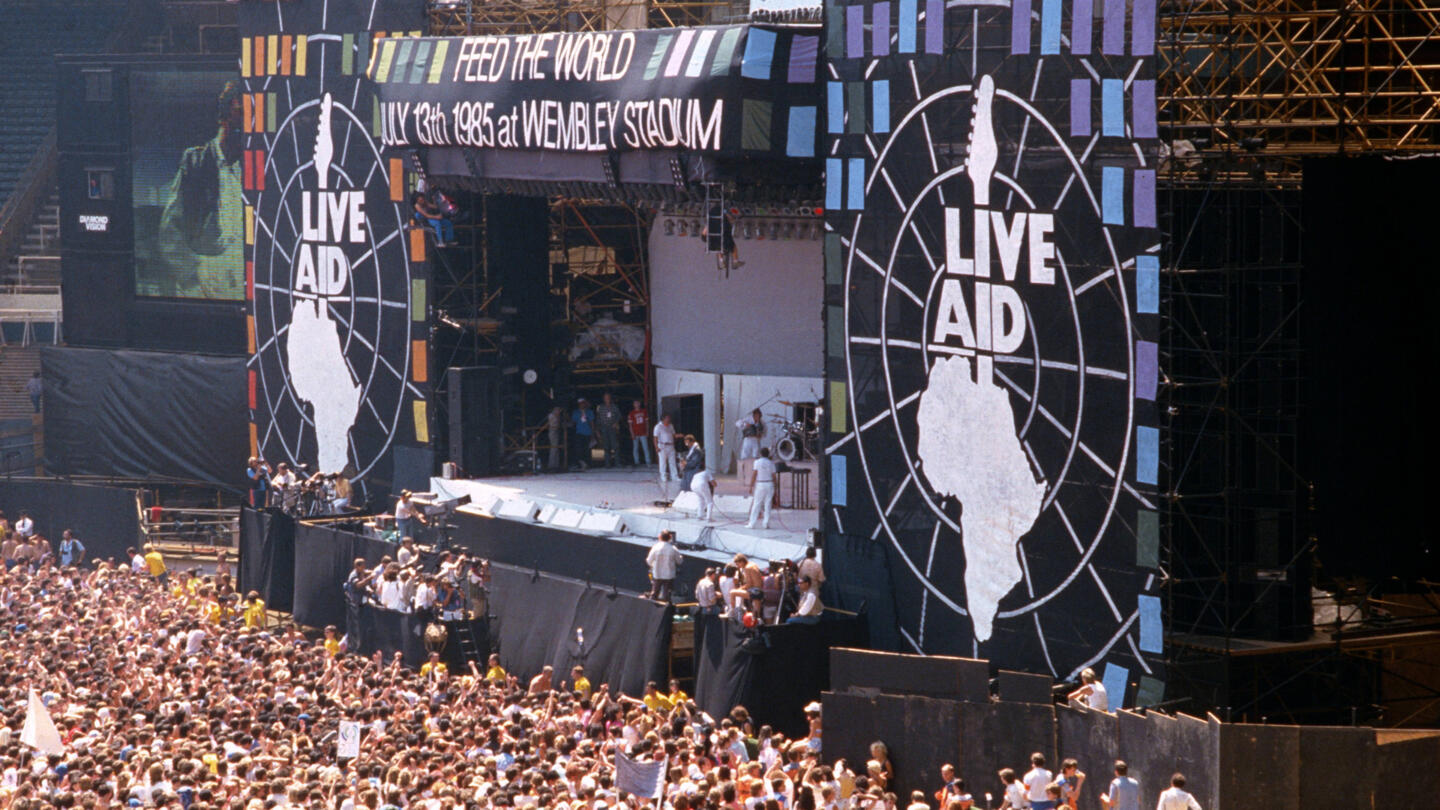
Live Aid concert raises $127 million for famine relief in Africa
On July 13, 1985, at Wembley Stadium in London, Prince Charles and Princess Diana officially open Live Aid, a worldwide rock concert organized to raise money for the relief of famine-stricken Africans. Continued at JFK Stadium in Philadelphia (where Joan Baez famously kicked it off by telling the crowd "this is your Woodstock, and it's long overdue") and at other arenas around the world, the 16-hour “superconcert” was globally linked by satellite to more than a billion viewers in 110 nations. In a triumph of technology and good will, the event raised more than $125 million in famine relief for Africa.
Live Aid was the brainchild of Bob Geldof, the singer of an Irish rock group called the Boomtown Rats. In 1984, Geldof traveled to Ethiopia after hearing news reports of a horrific famine that had killed hundreds of thousands of Ethiopians and threatened to kill millions more. After returning to London, he called Britain’s and Ireland’s top pop artists together to record a single to benefit Ethiopian famine relief. “Do They Know It’s Christmas?” was written by Geldof and Ultravox singer Midge Ure and performed by “Band Aid,” an ensemble that featured Culture Club, Duran Duran, Phil Collins, U2, Wham! and others. It was the best-selling single in Britain to that date and raised more than $10 million.
“Do They Know It’s Christmas?” was also a No. 1 hit in the United States and inspired U.S. pop artists to come together and perform “We Are the World,” a song written by Michael Jackson and Lionel Richie. “USA for Africa,” as the U.S. ensemble was known, featured Jackson, Richie, Geldof, Harry Belafonte, Bob Dylan, Cyndi Lauper, Paul Simon, Bruce Springsteen, Tina Turner, Stevie Wonder, and many others. The single went to the top of the charts and eventually raised $44 million.
With the crisis continuing in Ethiopia, and the neighboring Sudan also stricken with famine, Geldof proposed Live Aid, an ambitious global charity concert aimed at raising more funds and increasing awareness of the plight of many Africans. Organized in just 10 weeks, Live Aid was staged on Saturday, July 13, 1985. More than 75 acts performed, including Elton John, Queen, Madonna, Santana, Run DMC, Sade, Sting, Bryan Adams, the Beach Boys, Mick Jagger, David Bowie, Queen, Duran Duran, U2, the Who, Tom Petty, Neil Young, and Eric Clapton. The majority of these artists performed at either Wembley Stadium in London, where a crowd of 70,000 turned out, or at Philadelphia’s JFK Stadium, where 100,000 watched. Thirteen satellites beamed a live television broadcast of the event to more than one billion viewers in 110 countries. More than 40 of these nations held telethons for African famine relief during the broadcast.
A memorable performance of the concert was by Queen, particularly frontman Freddie Mercury, who unexpectedly stole the show with a fierce performance. With the group losing steam as they went into the early 1980s after a career of multiple hits, they offered the crowd an unforgettable 20-minute performance. Going from "Bohemian Rhapsody" to "We Will Rock You" and finishing with "We Are the Champions," Queen captivated the audience with a journey through their hits, with Mercury at the helm.
Another top moment was by Phil Collins in Philadelphia after flying by Concorde from London, where he performed at Wembley earlier in the day. He later played drums in a reunion of the surviving members of Led Zeppelin. Beatle Paul McCartney and the Who’s Pete Townsend held Bob Geldof aloft on their shoulders during the London finale, which featured a collective performance of “Do They Know It’s Christmas?” Six hours later, the U.S. concert ended with “We Are the World.”
Live Aid eventually raised $127 million in famine relief for African nations, and the publicity it generated encouraged Western nations to make available enough surplus grain to end the immediate hunger crisis in Africa. Geldof was later knighted by Queen Elizabeth II for his efforts.
In early July 2005, Geldof staged a series of “Live 8″ concerts in 11 countries around the world to help raise awareness of global poverty. Organizers, led by Geldof, purposely scheduled the concert days before the annual G8 summit in an effort to increase political pressure on G8 nations to address issues facing the extremely poor around the world. Live 8 claims that an estimated 3 billion people watched 1,000 musicians perform in 11 shows, which were broadcast on 182 television networks and by 2,000 radio stations. Unlike Live Aid, Live 8 was intentionally not billed as a fundraiser–Geldof’s slogan was, “We don’t want your money, we want your voice.” Perhaps in part because of the spotlight brought to such issues by Live 8, the G8 subsequently voted to cancel the debt of 18 of the world’s poorest nations, make AIDS drugs more accessible, and double levels of annual aid to Africa, to $50 billion.

BLACK HISTORY
2015
Sandra Bland dies in jail after traffic stop confrontation
Only July 10, 2015, Texas State Trooper Brian Encinia pulls over a 28-year-old Black woman, Sandra Bland, for failing to signal a lane change. After a heated encounter, he arrests her and takes her to a nearby jail. Three days later, on the morning of July 13, she is found dead.
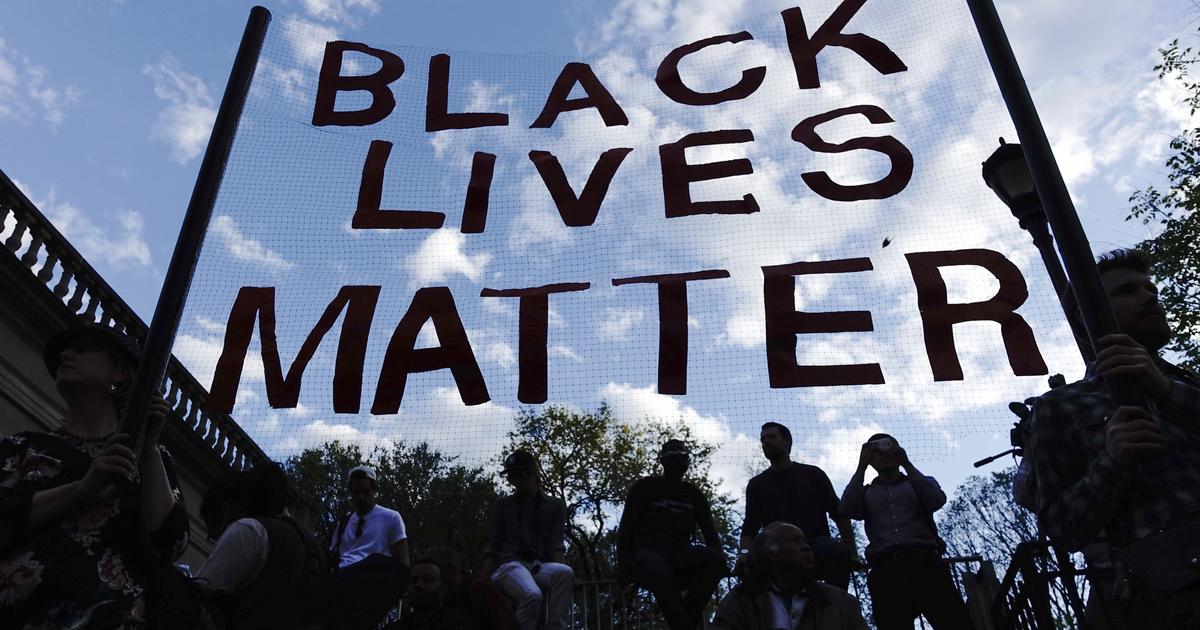
Black Lives Matter
BLACK HISTORY
2013
The hashtag #BlackLivesMatter first appears, sparking a movement
Outraged and saddened after the acquittal of George Zimmerman, the Florida man who killed a Black teenager in 2012, Oakland, California resident Alicia Garza posts a message on Facebook on July 13, 2013. Her post contains the phrase "Black lives matter,"
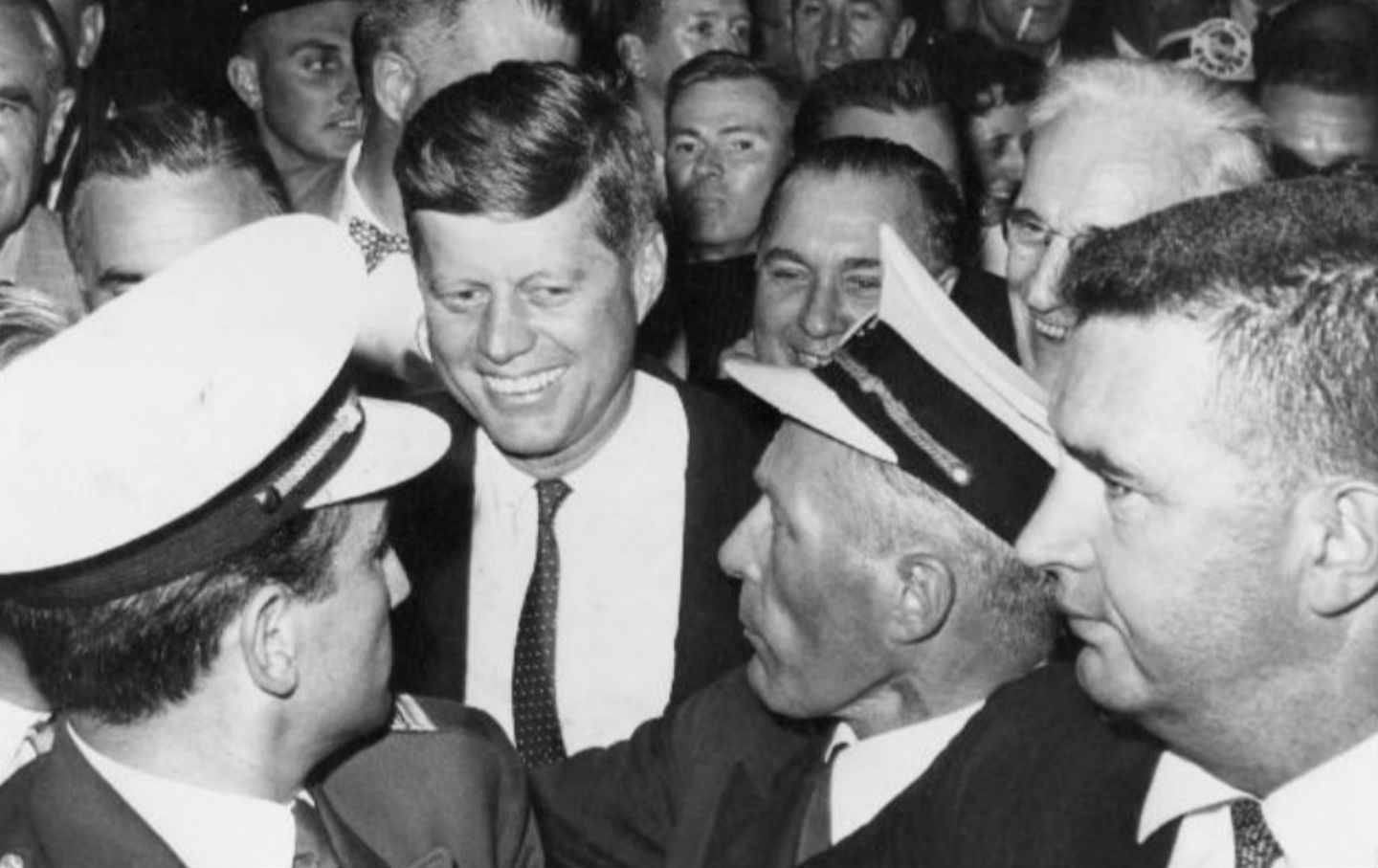
U.S. PRESIDENTS
1960
John F. Kennedy nominated for presidency
In Los Angeles, California, Senator John F. Kennedy of Massachusetts is nominated for the presidency by the Democratic Party Convention, defeating Senator Lyndon B. Johnson of Texas. The next day, Johnson was named Kennedy’s running mate by a unanimous vote of the convention.
/arc-anglerfish-arc2-prod-mco.s3.amazonaws.com/public/RUFYDFYQDBEQTFNRDYQAFD6PC4.jpg)
WORLD WAR II
1943
Largest tank battle in history ends
The Battle of Kursk, involving some 6,000 tanks, two million men, and 5,000 aircraft, ends with the German offensive repulsed by the Soviets at heavy cost. In early July, Germany and the USSR concentrated their forces near the city of Kursk in western Russia.

FRANCE
1793
Charlotte Corday assassinates French revolutionary Jean-Paul Marat
Jean-Paul Marat, one of the most outspoken leaders of the French Revolution, is stabbed to death in his bath by Charlotte Corday, a Royalist sympathizer. Originally a doctor, Marat founded the journal L’Ami du Peuple in 1789,

INVENTIONS & SCIENCE
1978
Henry Ford II fires Lee Iacocca
On July 13, 1978, Ford Motor Company chairman Henry Ford II fires Lee Iacocca as Ford’s president, ending years of tension between the two men. Born to an immigrant family in Pennsylvania in 1924, Iacocca was hired by Ford as an engineer in 1946 but soon switched to sales.
:no_upscale()/cdn.vox-cdn.com/uploads/chorus_image/image/54756467/GettyImages_515045098.0.jpg)
VIETNAM WAR
1969
George Wallace criticizes President Nixon’s handling of the war
Former Alabama Governor George Wallace criticizes President Richard Nixon for his handling of the war and says he favors an all-out military victory if the Paris talks fail to produce peace soon. Wallace had run unsuccessfully against Nixon as a third party candidate in the 1968.
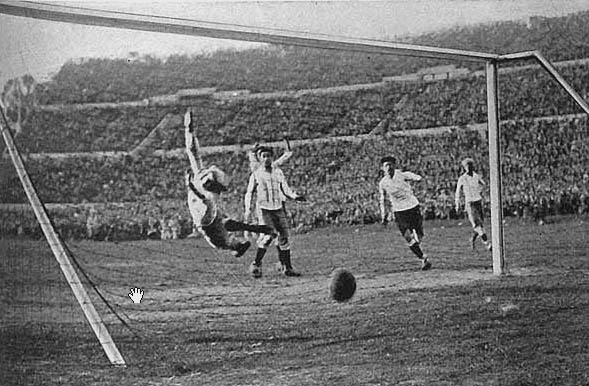
SPORTS
1930
First World Cup
On July 13, 1930, France defeats Mexico 4-1 and the United States defeats Belgium 3-0 in the first-ever World Cup football matches, played simultaneously in host city Montevideo, Uruguay. The World Cup has since become the world’s most watched sporting event.

ART, LITERATURE, AND FILM HISTORY
1990
"Ghost" opens in theaters
On July 13, 1990, the romantic-thriller Ghost, starring Demi Moore, Patrick Swayze and Whoopi Goldberg, opens in theaters across the United States. The film, about a woman who communicates with her murdered husband through a psychic.
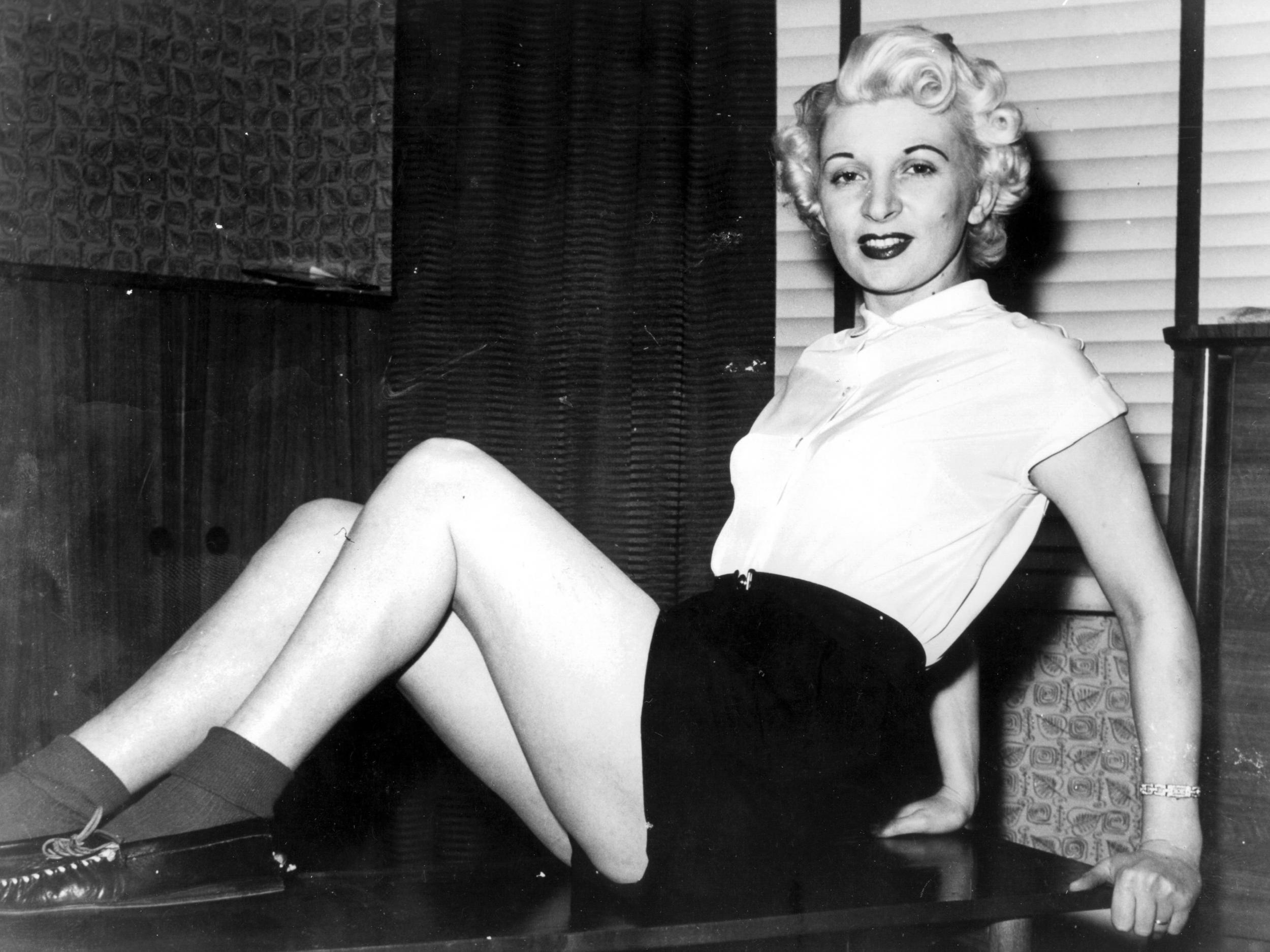
CRIME
1955
Last woman hanged for murder in Great Britain
Nightclub owner Ruth Ellis is convicted of murdering boyfriend David Blakely on July 13, 1955. Ellis was later executed by hanging and became the last woman in Great Britain to be put to death. Ellis was born in Rhyl, Wales, in 1926.

WESTWARD EXPANSION
1787
Congress enacts the Northwest Ordinance
On July 13, 1787, Congress enacts the Northwest Ordinance, structuring settlement of the Northwest Territory and creating a policy for the addition of new states to the nation. The members of Congress knew that if their new confederation were to survive intact.
TODAY IN HISTORY IN NIGERIA

1934 Akinwande Oluwole "Wole" Soyinka, writer, poet and playwright was born in Abeokuta. He was awarded the Nobel prize for Literature in 1986
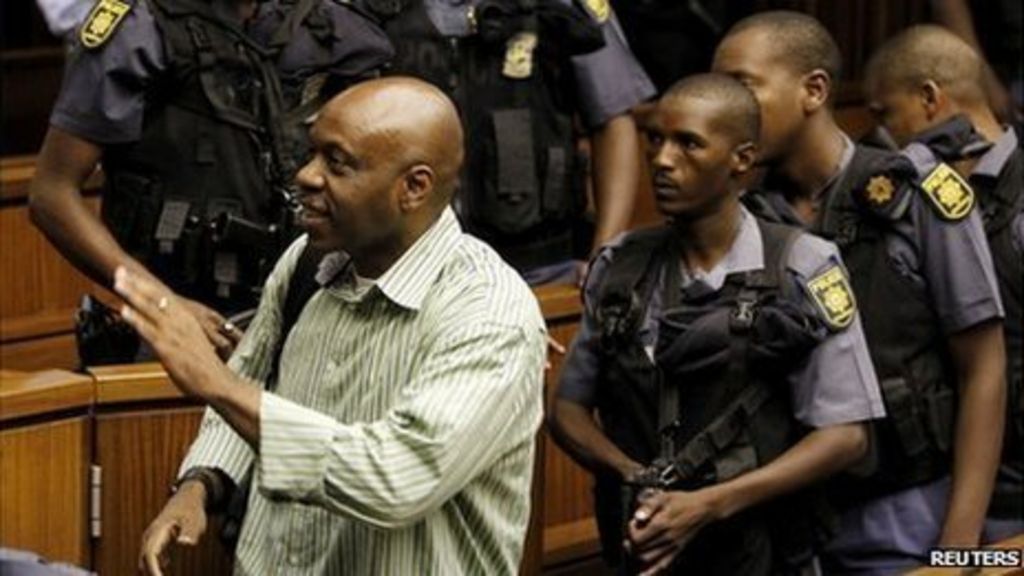
2009 MEND leader, Henry Okah, released by the Umar Musa Yar'Adua government after spending more than a year in detention while being tried for treason and gun-running
Comments
Post a Comment